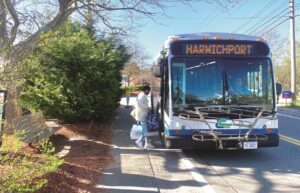PROVINCETOWN — About an hour before sunrise on Friday, May 5, a Cape Cod Regional Transit Authority bus will leave the affordable housing complex at Nauset Green in Eastham and start driving north. After one stop in Eastham, four in Wellfleet, and four in Truro, it will arrive at MacMillan Pier in Provincetown at 5:24 a.m. — an hour before the CCRTA’s Flex bus from Harwich arrives.
The Eastham-to-Provincetown route will run again later that morning, then twice more late at night in the opposite direction. The late-night routes start at 11:30 p.m. and 1:30 a.m. to help people who work restaurant and bar shifts in Provincetown get to their homes in Truro, Wellfleet, and Eastham for the $2 bus fare instead of having to spend their earnings on a taxi ride that costs 10 times as much.

The Provincetown Select Board began discussing options with the CCRTA in January. Negotiations did not go smoothly, however. The agency told the town in February that it could set up a pilot program for extra routes, but then said a few days later that union rules and a lack of staff would make that impossible. The town’s leaders placed Article 14, a $100,000 funding measure for a town-organized bus program, on the annual town meeting warrant, only to have the CCRTA say, after the warrant was finalized, that it in fact could run the extra routes at no charge to the town.
Town Manager Alex Morse asked town meeting voters to pass Article 14 anyway. The money would be returned to the town’s free cash account if it were not needed, he said.
Select board member Leslie Sandberg asked voters to support Article 14 as a statement to the CCRTA. “Let’s send a message to them tonight that we’re serious about helping people,” she said. The vote in favor was nearly unanimous.
Two weeks later, the CCRTA announced two early-morning buses into town and two late-night buses out — double what they had offered in March.
The expanded service begins on May 5 and runs on Fridays, Saturdays, and Sundays until May 22, when the extra routes will begin running seven days a week through the summer.
Seasonal Workers
According to datacapecod.org, the Cape Cod Commission’s data clearinghouse, the Outer Cape adds about 5,000 seasonal jobs every year. Many who fill them live here year-round, earning most of their income during the summer, but some are true seasonal residents, arriving in spring and departing in the fall.
According to U.S. Postal Service data, about 1,800 people temporarily move their addresses to the Outer Cape during the spring and early summer, but not all of those can be assumed to be working here.
The seasonal workers least likely to have access to a car are those flying here from overseas through the State Dept.’s Summer Work Travel program for college students (on J-1 visas) and the Dept. of Labor’s temporary nonagricultural worker program (with H-2B visas).
Data on H-2B applications for this year have not been released yet, but in 2022, employers on the Outer Cape were certified for 736 H-2B workers, most of whom were recruited from Jamaica to work as housekeepers and cooks.
There were 426 J-1 students on the Outer Cape last year, most of whom worked in the region’s three largest industries: restaurants, accommodations, and retail. The majority come from countries in southeastern Europe, especially Bulgaria.
While their experiences vary, these workers typically start in Cape Cod’s lowest-paying jobs — sometimes two or three of them simultaneously. They routinely work 10 or 12 hours a day.
At town meeting, Jaime de Sousa spoke on Article 14. He said he supported the expanded bus program and hoped to see more like it. De Sousa said he was working with Latino clients of Outer Cape Health Services over the winter and arranging travel to appointments in the mid-Cape was a problem.
“Trying to get folks to a dentist appointment incurs a six-hour round trip,” de Sousa said. That made keeping up with health care nearly impossible for those without a car.

Even with the newly expanded bus schedule, CCRTA buses typically leave Provincetown once every two hours. There is a three-hour gap between the 6:50 a.m. and 10 a.m. departures.
On Monday, May 1, Asantia Braithwaite was at the bus stop outside Stop & Shop with several shopping bags. She is working at Mac’s Fish House in Provincetown on an H-2B visa this summer. In Barbados, she works as a policy analyst at the Caribbean Policy Development Centre.
The day was sunny, but the breeze was cool. Braithwaite said she had noticed that many of the bus stops here are unsheltered.
“All the bus stops in Barbados have shelters,” Braithwaite said. “Some of them are pretty nice. Private people will pay for them — they’ll put someone’s name on the shelter, or a company’s name.”
Sheltered bus stops are rare here, despite the weather; according to the CCRTA’s schedule, there are only three covered stops on the Outer Cape. The one at Stop & Shop is a single bench, sheltered only by a sycamore tree.
